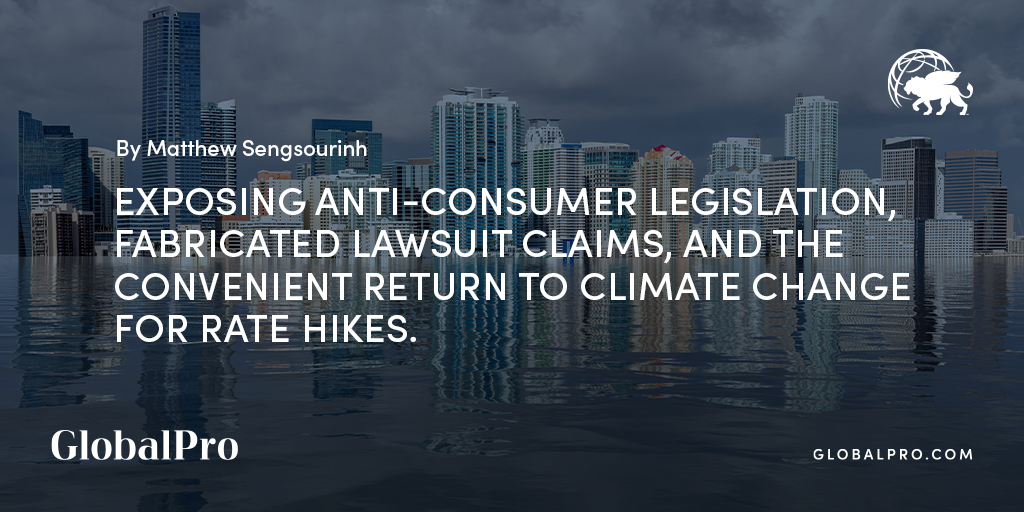Exposing Anti-Consumer Legislation, Fabricated Lawsuit Claims, and the Convenient Return to Climate Change for Rate Hikes
By Matthew Sengsourinh, President of GlobalPro Florida

In the intricate dance of the insurance industry, recent times have witnessed a seemingly paradoxical surge in anti-consumer legislation, raising questions about the motivations behind these legal maneuvers. Critics argue that the insurance industry, shrouded in ambiguity, exploits narratives such as the alleged high costs of lawsuits, only to pivot back to climate change as a justification for rate hikes – a familiar narrative before the pandemic. This article seeks to untangle the complex web woven by insurers, exploring the basis for recent anti-consumer legislation, exposing the dubious claims about lawsuit costs, and questioning the sudden resurgence of climate change as a perennial excuse for demanding higher rates.
The Murky Landscape of Anti-Consumer Legislation
The recent wave of anti-consumer legislation has ignited skepticism among consumers, prompting them to question the motives behind laws purportedly designed to protect insurers from escalating costs, particularly those associated with lawsuits. This legislative trend necessitates a critical examination of insurers’ transparency and an exploration into the true financial impact of lawsuits on the industry.
The Lawsuit Conundrum: Unveiling the Lack of Data
Insurers have consistently argued that the cost of lawsuits is spiraling out of control, justifying the need for legislative interventions to maintain financial stability. However, the absence of comprehensive data supporting these claims raises questions about the authenticity of the crisis. Is proposed legislation genuinely aimed at addressing an industry threat, or is it a strategic move to bolster profits? The lack of transparency in disclosing critical information adds fuel to consumer skepticism.
Climate Change as a Convenient Distraction
Climate change, once a global concern dominating discussions, has made a sudden return to the forefront of the insurance discourse. While skeptics acknowledge the real risks it poses to the industry, they argue that its sudden prominence is a distraction, conveniently rationalizing rate increases. This article delves into the legitimacy of climate change concerns within the context of insurance dynamics and the potential exploitation of its narrative for financial gain.
Insurance Rates: A Suspicious Upward Trajectory
Historical data exposes a persistent upward trajectory in insurance rates, regardless of comprehensive information on alleged lawsuit surges or the genuine impact of climate change. The continuous demand for higher rates raises concerns about the industry’s motivations behind the legislative push and its commitment to transparency.
Miami’s Real Estate Boom Amidst the Smoke and Mirrors
Despite being labeled the riskiest county in the U.S. by insurers, Miami’s real estate market experienced a surprising surge post-pandemic. The “Miami paradox” emerges as insurance premiums continue to rise, averaging $5,919 for a single-family home. This article explores the counterintuitive climb in insurance rates and the unique challenges posed by climate change in the Florida market.
Florida’s Peculiar Predicament: Unraveling the Threads
Florida holds the dubious distinction of being the most expensive market for homeowners insurance, with premiums exceeding $6,000 – more than three times the national average. The convergence of various policies, including wind policies often foregone by cash-paying buyers, contributes to a unique market dynamic in Miami-Dade County.
Climate Change and the Insurance Dilemma: A Closer Look
The looming specter of climate change significantly contributes to soaring insurance rates, with projections indicating potential annual property losses of $988 million by 2050 in Miami-Dade County. This urgency prompts insurers to increase rates, leading to the exodus of major providers from the Florida market and leaving homeowners with limited options.
Market in Turmoil: The Exodus of Insurers Revealed
Escalating risk levels and insurers’ reluctance to accurately price climate risks have resulted in a mass exodus from the Florida market. The departure of major providers intensifies challenges faced by the real estate market, prompting a surge in enrollments for Citizens Property Insurance.
Buyer Resilience and Negotiation Strategies: Navigating the Smoke
Despite climate risks and rising insurance costs, residential buyers in Miami remain undeterred, leveraging these challenges to negotiate better deals. However, the disconnect between buyer priorities and impending climate challenges raises questions about the long-term sustainability of the real estate market.
The complex interplay between anti-consumer legislation, questionable lawsuit claims, the persistent demand for higher rates, and the strategic return to climate change narratives creates a convoluted narrative within the insurance industry. Consumers are left grappling with a lack of transparency as insurers pivot between issues, emphasizing the need for clear and comprehensive information. Until insurers provide the necessary data to substantiate their demands, consumer skepticism remains justified, casting a shadow over the true motivations behind the insurance industry’s ongoing maneuvers.
Reference:


